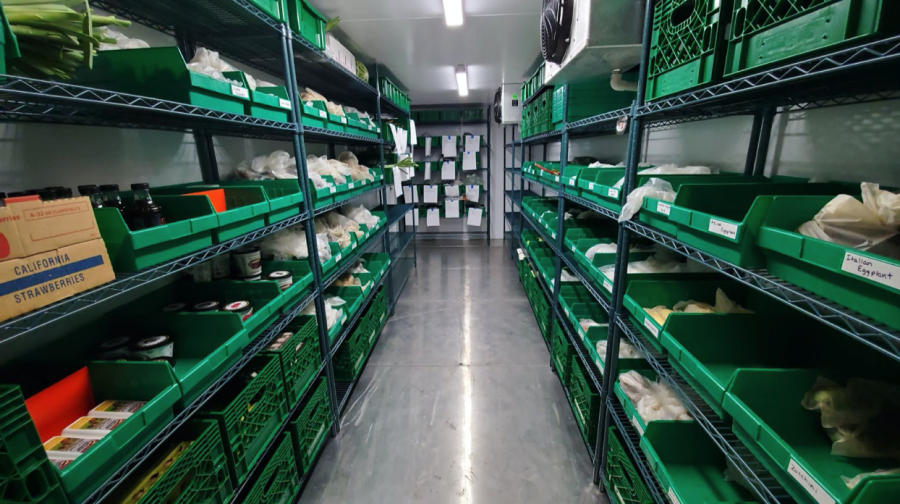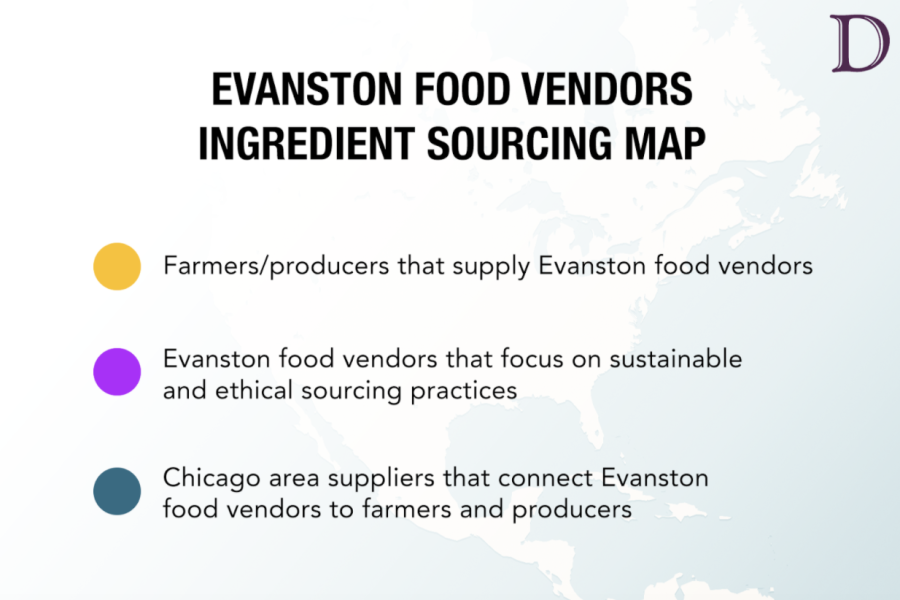Evanston restaurants and food vendors focus on local, sustainable sourcing
Village Farmstand, a micro-warehouse community grocery store in Evanston, aims to connect customers to local farmers that support ethical and fair farming practices.
April 14, 2022
Evanston’s eateries offer a variety of options for herbivores and meat-eaters alike, and an increasing number of food establishments are focusing on ethical sourcing and sustainability in their practices.
Restaurants that offer plant-based and sustainably-sourced food options in Evanston range from contemporary American restaurant Found Kitchen’s locally driven “flexitarian” menu to the new fast-casual spot elephant + vine, which opened in March and offers exclusively vegan meals.
Blind Faith Cafe, which has won the “Best Vegetarian” category in The Daily’s Best of Evanston awards three times, is one of two Evanston restaurants designated as “Certified Green” by the Green Restaurant Association.
To be Certified Green, a restaurant must meet criteria in several environmental sustainability categories established by the association, like water efficiency and chemical and pollution reduction.
Weinberg freshman Olivia Schenker said it has been surprisingly easy to find vegan food options in Evanston since coming to campus.
“Evanston honestly has a lot more vegan options and vegan restaurants than I had expected because it’s a small town,” Schenker said.
She said Ovo Frito Café and elephant + vine are some of her favorite spots for plant-based foods.
Schenker said while she knows achieving full sustainability in the restaurant industry is challenging, her decisions when dining out are driven mainly by the number of vegan options available.
“I just kind of go for vegan, and if they are sustainable, that’s amazing,” Schenker said. “But there’s only so much I can do.”
Edible Evanston, a program under the nonprofit organization Citizens’ Greener Evanston, focuses on growing and sharing food locally, as well as educating the public about sustainability.
Edible Evanston Co-Leader Tim Sonder (Medill ’83) said when it comes to sourcing food, “the more local you get, the better it is.”
“I am definitely a proponent of locally-grown foods, which will potentially protect our regional environment, our regional food supply in general and the land stewardship of the region,” Sonder said.
Sonder said national interest in consuming locally-sourced food has increased in popularity recently. He cited Community Supported Agriculture, where residents invest in a local farm operation in advance and receive part of the harvest in return, as an effort that “really skyrocketed during the pandemic because people wanted to know where their food was from.”
Curt’s Cafe is one organization doing important sustainability-related work in Evanston, Sonder said.
According to Vice President of Operations and Student Development Karen Smith, Curt’s Cafe strives to source locally to serve the community coffee, pastries, sandwiches and more.
Smith said the cafe grows its own fruits and vegetables at an on-site garden during the summer, as well as sourcing most ingredients from Chicago suppliers that partner with small farmers and producers.
As a workforce training program, Curt’s Cafe employs young adults from 15 to 24 years old who live in at-risk situations, like those who have contact with the judicial system or are unhoused. As “student-trainees,” the employees develop life-skills training and receive work experience..
Like Curt’s Cafe, Village Farmstand, a community grocery store on Dempster Street, focuses on sustainability by connecting customers to local farmers located within 150 miles that support ethical and fair-farming practices, according to owner Matt Wechsler.
Wechsler said people looking to eat more sustainably should focus on eating seasonal produce and finding ethically-sourced protein if they eat meat.
“If there’s somebody who eats meat, by and large, the meat in our country comes from sources that exploit the land, exploit the workforce and exploit a lot of government policies as well to subsidize that cheap food,” Wechsler said.
He said many factors go into ethical and sustainable animal farming, including regenerating soil, capturing carbon dioxide and ensuring animals enjoy fair and equitable livelihoods.
Wechsler pointed to Hewn, a female-owned rustic bakery on Central Street, as a source for sustainably-sourced bread products in town.
According to its website, Hewn’s ingredients are 100% organic and sourced from “small, local farmers.” Hewn also lists farmers and producers they work with on their website, more than half of which are located in Illinois.
The Green Restaurant Association lists Transparency & Education as one of eight environmental categories used to evaluate restaurants’ sustainability practices. According to the organization’s website, the standards aim to provide a “transparent way to measure each restaurant’s environmental accomplishments while providing a pathway for the next steps each restaurant can take towards increased environmental sustainability.”
“Restaurants can be a major contributor to the economics of growing food in a sustainable way,” Sonder said. “And (they) also serve as a gateway to educate the public about the availability and the importance of sustainably grown and locally grown foods.”
Email: [email protected]
Twitter: @jacob.wendler
Related Stories:
— New vegan restaurant elephant + vine increases plant-based food options in Evanston
— Hot from the Oven: Putting Blind Faith into plant-based food
— Hot from the Oven: From farm to tavern, locally-sourced Farmhouse creates Midwestern feel













